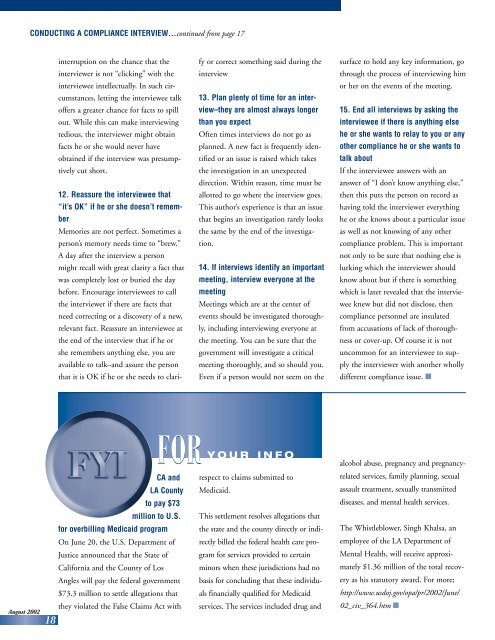JR - Health Care Compliance Association
JR - Health Care Compliance Association
JR - Health Care Compliance Association
You also want an ePaper? Increase the reach of your titles
YUMPU automatically turns print PDFs into web optimized ePapers that Google loves.
CONDUCTING A COMPLIANCE INTERVIEW...continued from page 17<br />
interruption on the chance that the<br />
interviewer is not “clicking” with the<br />
interviewee intellectually. In such circumstances,<br />
letting the interviewee talk<br />
offers a greater chance for facts to spill<br />
out. While this can make interviewing<br />
tedious, the interviewer might obtain<br />
facts he or she would never have<br />
obtained if the interview was presumptively<br />
cut short.<br />
12. Reassure the interviewee that<br />
“it’s OK” if he or she doesn’t remember<br />
Memories are not perfect. Sometimes a<br />
person’s memory needs time to “brew.”<br />
A day after the interview a person<br />
might recall with great clarity a fact that<br />
was completely lost or buried the day<br />
before. Encourage interviewees to call<br />
the interviewer if there are facts that<br />
need correcting or a discovery of a new,<br />
relevant fact. Reassure an interviewee at<br />
the end of the interview that if he or<br />
she remembers anything else, you are<br />
available to talk–and assure the person<br />
that it is OK if he or she needs to clarify<br />
or correct something said during the<br />
interview<br />
13. Plan plenty of time for an interview–they<br />
are almost always longer<br />
than you expect<br />
Often times interviews do not go as<br />
planned. A new fact is frequently identified<br />
or an issue is raised which takes<br />
the investigation in an unexpected<br />
direction. Within reason, time must be<br />
allotted to go where the interview goes.<br />
This author’s experience is that an issue<br />
that begins an investigation rarely looks<br />
the same by the end of the investigation.<br />
14. If interviews identify an important<br />
meeting, interview everyone at the<br />
meeting<br />
Meetings which are at the center of<br />
events should be investigated thoroughly,<br />
including interviewing everyone at<br />
the meeting. You can be sure that the<br />
government will investigate a critical<br />
meeting thoroughly, and so should you.<br />
Even if a person would not seem on the<br />
surface to hold any key information, go<br />
through the process of interviewing him<br />
or her on the events of the meeting.<br />
15. End all interviews by asking the<br />
interviewee if there is anything else<br />
he or she wants to relay to you or any<br />
other compliance he or she wants to<br />
talk about<br />
If the interviewee answers with an<br />
answer of “I don’t know anything else,”<br />
then this puts the person on record as<br />
having told the interviewer everything<br />
he or she knows about a particular issue<br />
as well as not knowing of any other<br />
compliance problem. This is important<br />
not only to be sure that nothing else is<br />
lurking which the interviewer should<br />
know about but if there is something<br />
which is later revealed that the interviewee<br />
knew but did not disclose, then<br />
compliance personnel are insulated<br />
from accusations of lack of thoroughness<br />
or cover-up. Of course it is not<br />
uncommon for an interviewee to supply<br />
the interviewer with another wholly<br />
different compliance issue. ■<br />
FOR<br />
CA and<br />
LA County<br />
to pay $73<br />
million to U.S.<br />
for overbilling Medicaid program<br />
On June 20, the U.S. Department of<br />
Justice announced that the State of<br />
California and the County of Los<br />
Angles will pay the federal government<br />
$73.3 million to settle allegations that<br />
they violated the False Claims Act with<br />
August 2002<br />
18<br />
YOUR INFO<br />
respect to claims submitted to<br />
Medicaid.<br />
This settlement resolves allegations that<br />
the state and the county directly or indirectly<br />
billed the federal health care program<br />
for services provided to certain<br />
minors when these jurisdictions had no<br />
basis for concluding that these individuals<br />
financially qualified for Medicaid<br />
services. The services included drug and<br />
alcohol abuse, pregnancy and pregnancyrelated<br />
services, family planning, sexual<br />
assault treatment, sexually transmitted<br />
diseases, and mental health services.<br />
The Whistleblower, Singh Khalsa, an<br />
employee of the LA Department of<br />
Mental <strong>Health</strong>, will receive approximately<br />
$1.36 million of the total recovery<br />
as his statutory award. For more;<br />
http://www.usdoj.gov/opa/pr/2002/June/<br />
02_civ_364.htm ■

















